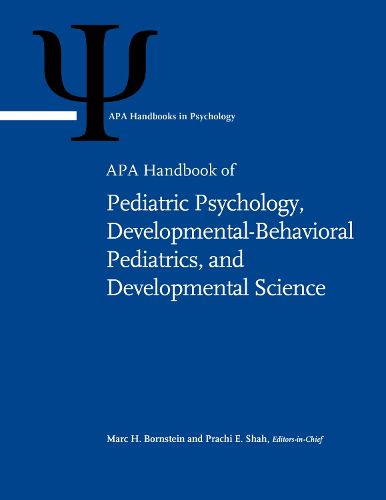Readings Newsletter
Become a Readings Member to make your shopping experience even easier.
Sign in or sign up for free!
You’re not far away from qualifying for FREE standard shipping within Australia
You’ve qualified for FREE standard shipping within Australia
The cart is loading…






This vital two-volume handbook summarizes current and emerging research and clinical evidence to provide a working knowledge of the contributions of pediatric psychology, developmental-behavioral pediatrics, and developmental science, and promote the integration of these disciplines to improve child and adolescent health and well-being.
In a nutshell, pediatric psychology emphasizes fostering children's adaptation in the face of illness and hospitalization; developmental-behavioral pediatrics aims to improve the health of children through an understanding of the biopsychosocial, educational, and cultural influences on them and their families; and developmental science focuses on theoretical and empirical advances in understanding mental, emotional, and social aspects of human development and their underlying and associated processes and contexts. There has been longstanding recognition of the need to more closely unite the three fields.
The APA Handbook of Pediatric Psychology, Developmental-Behavioral Pediatrics, and Developmental Science aims to deepen communication between these domains by providing an integrative approach to addressing specific issues in child well-being. Chapters in Volume 1 highlight the developmental origins of risk and resilience across early phases of the life course, covering developmental science framing and processes, biopsychosocial systems in development, and social and material contexts of child and adolescent health and well-being. The contributions in Volume 2 focus on clinical applications of developmental science in pediatric psychology and developmental-behavioral pediatrics, discussing family systems and ecological contexts, child developmental contexts and child health conditions, and developmental-behavioral and mental health conditions.
The handbook coeditors-in-chief recruited a diverse array of outstanding professionals from developmental science, medicine, and pediatric psychology. This stellar roster prompts trainees, researchers, practitioners, and other professionals to explore new ways to understand and manage child and adolescent health and well-being, and promote deeper interdisciplinary collaborations that can support growth and development.
$9.00 standard shipping within Australia
FREE standard shipping within Australia for orders over $100.00
Express & International shipping calculated at checkout
This vital two-volume handbook summarizes current and emerging research and clinical evidence to provide a working knowledge of the contributions of pediatric psychology, developmental-behavioral pediatrics, and developmental science, and promote the integration of these disciplines to improve child and adolescent health and well-being.
In a nutshell, pediatric psychology emphasizes fostering children's adaptation in the face of illness and hospitalization; developmental-behavioral pediatrics aims to improve the health of children through an understanding of the biopsychosocial, educational, and cultural influences on them and their families; and developmental science focuses on theoretical and empirical advances in understanding mental, emotional, and social aspects of human development and their underlying and associated processes and contexts. There has been longstanding recognition of the need to more closely unite the three fields.
The APA Handbook of Pediatric Psychology, Developmental-Behavioral Pediatrics, and Developmental Science aims to deepen communication between these domains by providing an integrative approach to addressing specific issues in child well-being. Chapters in Volume 1 highlight the developmental origins of risk and resilience across early phases of the life course, covering developmental science framing and processes, biopsychosocial systems in development, and social and material contexts of child and adolescent health and well-being. The contributions in Volume 2 focus on clinical applications of developmental science in pediatric psychology and developmental-behavioral pediatrics, discussing family systems and ecological contexts, child developmental contexts and child health conditions, and developmental-behavioral and mental health conditions.
The handbook coeditors-in-chief recruited a diverse array of outstanding professionals from developmental science, medicine, and pediatric psychology. This stellar roster prompts trainees, researchers, practitioners, and other professionals to explore new ways to understand and manage child and adolescent health and well-being, and promote deeper interdisciplinary collaborations that can support growth and development.